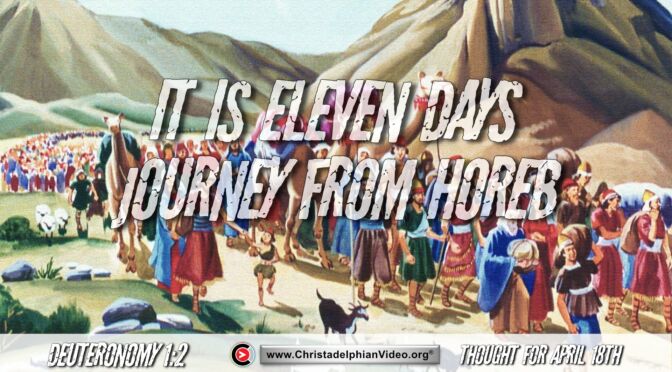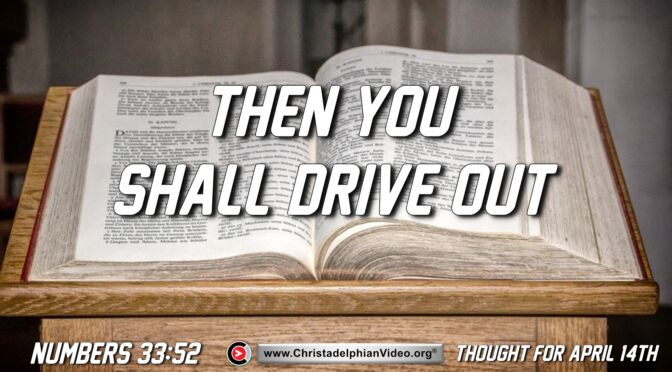It’s the Thought that counts “The difference is LOVE: 23|4|2020”

The Following thought for the day was written by Brother Richard Morgan and provides insight and encouragement for those seeking to serve the God of Israel.
The book of Deuteronomy is written in the form of an ancient covenant treaty that were commonly written up between a Suzerain (a ruling state in Old Testament times that had control over other internally autonomous states) and vassal (a state ruled by the Suzerain). Those covenants began with a preamble illustrating the historical dealings between the Suzerain and his vassal. What followed were the stipulations of the covenant – what the vassal was required to do – and ended with a list of blessings should the vassal keep the terms of the covenant, and curses if they did not. Deuteronomy is also an ancient text and is written in this same time period with this structure, beginning in the first few chapters with the historical preamble. We’re now starting to read, from chapter 6, the stipulations of the covenant and, at the end of Deuteronomy, the list of blessings and curses.
Yet there is one key difference within the covenant between Yahweh and his people in the book of Deuteronomy from the ancient Suzerain texts. And that difference becomes apparent with one of the key words in Deuteronomy that is hardly found anywhere else in the other books of the law; it appears only twice in both Exodus and Leviticus, and never in Numbers. That word is love, translated from the Hebrew word ahab. In Deuteronomy that word and its associated meaning, suddenly bursts into focus. The first time the word is used is in chapter 4 is where God explains the motivation behind bringing the Hebrews out of Egypt – “And because he loved your fathers and chose their offspring after them and brought you out of Egypt with his own presence, by his great power” (v.37). Love then becomes the power which binds Yahweh and Israel together. Its next occurrence is in chapter 5, when God tells Israel he is “showing steadfast love to thousands of those who love me and keep my commandments” (v.10). The first occurrence of “love” in this verse is a different word – chesed – and is another key word and idea in Deuteronomy. It’s a word very often connected with God’s covenant with his people and has the idea of loyalty. It’s the kind of loyal love that binds people together in a covenant relationship, like a husband and wife, close friends, or members of an ecclesia. The second word translated as “love” is ahab, which shows that what God is expecting is a two-way relationship. He has loved his people by bringing them out of Israel, but the covenant is based on them reciprocating that love.
The very first occurrence of the word ahab in the Bible is in Genesis 22:2 where God says to Abraham, “Take your son, your only son Isaac, whom you love, and go to the land of Moriah, and offer him there as a burnt offering.” The covenant God made with Abraham illustrates the meaning of love. While Abraham loved his son Isaac, his love for God motivated him to obey him. Love, of course, is nothing without trust, and Abraham had such trust in God that he was willing to even slay his son. That’s the sort of bond God wants with his people.
In our reading for today, the massive import of love becomes apparent in what the Jews call the Shema, the central tenet of God’s relationship with his people – “Hear, O Israel: The Lord our God, the Lord is one. You shall love the Lord your God with all your heart and with all your soul and with all your might” (6:4-5). Jesus himself said this is the most important of all God’s laws, and is coupled with the verse in Leviticus (one of only two occurrences of the word love in that book) which commands us to “love your neighbor as yourself” (Lev. 19:18). These two commandments together are the basis of every single stipulation of the covenant God makes with his people.
What God is looking for is a relationship with us. When we listen to the word of God, we need to understand the spirit behind it. Paul says, “For you did not receive the spirit of slavery to fall back into fear, but you have received the Spirit of adoption as sons, by whom we cry, ‘Abba! Father!’” What the Jews ultimately missed was the power of love. They only saw the stipulations of the covenant as a list of rules to be kept in order to receive blessings. They had a Suzerain-vassal relationship with God, but no more than that. We need to understand that the motivation behind God’s involvement in our lives is love, the kind of love that Abraham had for his only son. That’s the spirit behind every word of God.
That’s why Deuteronomy 6 was on Jesus’ minds after he heard the voice from heaven saying, “This is my beloved Son, with whom I am well pleased” (Matt. 3:17). He went into the wilderness and was tempted for forty days with the understanding that the spirit behind his trials was a father who loved his son. He didn’t take a scroll of Deuteronomy into the wilderness with him, because the words were on his heart (Deut. 6:6); and as he went through his temptations, his reaction to them was all based on his loving relationship with his heavenly father. Two of the quotations he made when countering the temptations are from Deuteronomy 6, the other from chapter 8. He loved Yahweh his God with all his heart. The heart describes the inner being, our feelings and desires. When tempted to turn stones into bread he gave his heart to God instead, quoting Deuteronomy 8. He also loved God with all his soul, his whole person. He gave his life to God. When tempted to throw himself from the pinnacle of the temple, he overcame the pride of life by quoting Deuteronomy 6. He loved God with all his might, a word meaning wealth or property. His wealth was not in having all the kingdoms of the world, and he overcame that temptation by once again quoting Deuteronomy 6.
Everything we think, everything we say, everything we do, should be motivated by love; love for God and love for each other. It’s the power that binds us all together and it’s the power which keeps us on the right path to God’s kingdom.
Richard Morgan,
Simi Hills, CA
https://www.podbean.com/site/default/externalPodcastBadges
View all the thoughts in this series here…
https://bibletruthandprophecy.com/its-the-thought-that-counts-thought-for-the-day/







